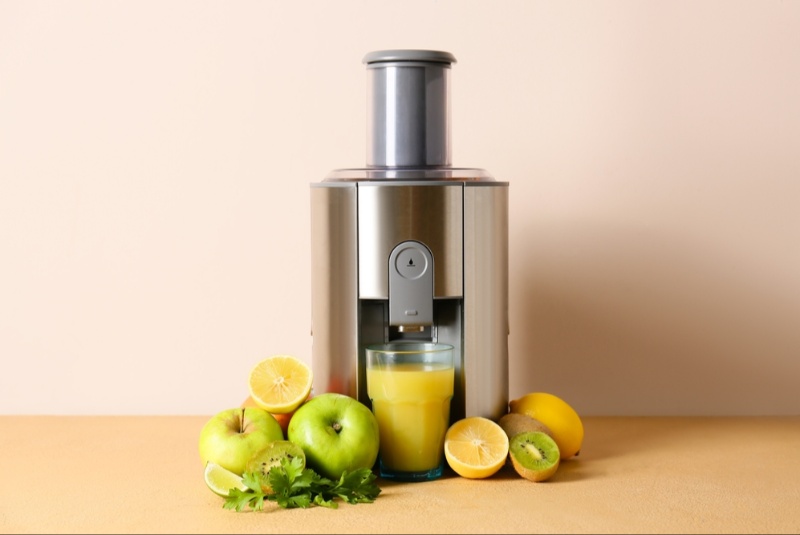Define Your Juicing Goals:
Before you even start shopping, ask yourself why you want a juicer. Is it to make daily green juices, occasional citrus drinks, or nut milks? Your juicing goals will dictate the type of juicer you need.
- Citrus Juicers: These juicers are perfect for squeezing out fresh orange, lemon, or grapefruit juices. They are typically inexpensive and easy to use but limited in function. If you're mainly interested in citrus juices and simplicity, a citrus juicer is an excellent choice.
- Centrifugal Juicers: These are high-speed machines perfect for beginners. They can juice a wide range of fruits and veggies but might not be as efficient with leafy greens or wheatgrass. If you're looking for versatility and convenience, a centrifugal juicer might be the right fit.
- Masticating (Cold Press) Juicers: Masticating juicers operate at slower speeds, ensuring minimal heat and oxidation during the juicing process. They're excellent for extracting juice from leafy greens, wheatgrass, and even nuts. If you're a health enthusiast and want to extract the maximum nutrients from your produce, a masticating juicer is an excellent investment.
Consider the Space & Design:
Remember that your juicer will be a fixture in your kitchen. Consider the counter space available and the machine's aesthetics. Do you need a compact design or can you accommodate a larger machine?
- Compact Juicers: If you have limited counter space, opt for a compact juicer that can easily fit into a small kitchen. These juicers are often designed with a smaller footprint and can be stored in cabinets when not in use.
- Larger Juicers: If space is not a concern, you can choose a larger juicer that may offer additional features and a higher juice yield. These juicers are usually more substantial and can be a prominent feature in your kitchen.
Speed & Efficiency:
For those always on the go, a fast juicer might be preferable. Centrifugal juicers quickly process fruits and veggies, making them a time-efficient choice. However, it's essential to note that speed can lead to heat, which might degrade some nutrients. On the other hand, masticating juicers are slower but generally produce a higher yield and retain more nutrients.
- Centrifugal Juicers: These machines operate at high speeds, making them perfect for those who need their juice quickly. They are great for busy mornings when you're in a hurry to get out the door. However, the high-speed operation can generate some heat, potentially affecting the nutritional content of the juice.
- Masticating Juicers: Masticating juicers work at a slower pace, chewing through fruits and vegetables to extract juice. While they take a bit more time, they are known for preserving more nutrients due to reduced heat and oxidation. If you have the patience and prioritize nutritional value, a masticating juicer is worth considering.
Noise Level:
If you're an early riser and don't want to disturb the rest of the household, the noise level of your juicer is crucial. Centrifugal juicers tend to be noisier than masticating ones.
- Centrifugal Juicers: These juicers are known for their higher noise levels. The high-speed spinning action can be quite loud, which might not be ideal if you're making juice early in the morning or late at night when others are sleeping.
- Masticating Juicers: Masticating juicers operate more quietly due to their slower pace. If noise is a concern, especially in shared living spaces, a masticating juicer will provide a quieter juicing experience.

Ease of Cleaning:
Nobody enjoys spending ages cleaning kitchen gadgets. Look for juicers that come apart easily and have fewer nooks and crannies. Some models even have dishwasher-safe parts.
- Centrifugal Juicers: Cleaning centrifugal juicers can be relatively straightforward. Many models have removable components that are dishwasher-safe, making cleanup more manageable. However, the high-speed design can result in more pulp residue that needs cleaning.
- Masticating Juicers: Masticating juicers also offer ease of cleaning. Their design usually has fewer parts and crevices, making it easier to disassemble and clean manually. Some users find that masticating juicers leave less pulp residue to clean up.
Pulp Preferences:
Do you enjoy pulp-free juice, or do you prefer some fiber in your drink? While most juicers come with adjustable pulp settings, masticating juicers tend to produce less frothy, smoother juices.
- Pulp Control: Many juicers come with pulp control settings, allowing you to customize the amount of pulp in your juice. Whether you like it pulpy or silky-smooth, you can adjust the settings accordingly.
- Masticating Juicers: Masticating juicers are known for producing smoother juices with less froth and pulp. If you prefer a more refined juice texture, a masticating juicer may be your choice.
Price vs. Value:
While it's essential to stick to a budget, it's equally crucial not to compromise on quality. Remember, an inexpensive juicer that breaks down after a few uses isn't a wise purchase. Consider it an investment in your health and well-being.
- Budget Juicers: If you're on a tight budget, there are affordable juicer options available. However, be cautious of extremely low-priced models, as they may lack durability and performance.
- Mid-Range Juicers: These juicers strike a balance between affordability and quality. They often offer a good combination of features and durability without breaking the bank.
- High-End Juicers: Premium juicers may come with advanced features, exceptional build quality, and extended warranties. While they come with a higher price tag, they are designed for long-term use and optimal performance.
Warranty and Customer Service:
Always check the warranty terms when purchasing a juicer. A longer warranty can be an indicator of the manufacturer's confidence in the product's durability. It's also a good idea to read customer reviews and see if the company is responsive and supportive when issues arise.
- Warranty: Look for juicers that offer warranties, especially on critical components like motors. A warranty can provide peace of mind and assurance of the product's quality.
- Customer Service: Research the manufacturer's reputation for customer service. Excellent customer support can be invaluable if you encounter any issues with your juicer down the line.
Extra Features:
Some juicers come with added functionalities such as the ability to make nut butter, sorbets, or even pasta. If these features appeal to you and align with your culinary interests, it might be worth investing in a more versatile machine.
- Additional Functions: Explore juicer models that offer extra capabilities beyond juicing. If you enjoy experimenting in the kitchen, a juicer that can also make nut butter, sorbets, or even pasta can add versatility to your culinary adventures.
Go for a Test Drive:
If possible, visit a store and try out a few models. This gives you a firsthand experience of how the machine operates, its noise level, and overall feel. Hands-on testing can help you make a more informed decision based on your personal preferences.
Choosing the right juicer is a blend of understanding your needs, doing diligent research, and sometimes even following your gut. The ideal juicer should align with your goals, be within your budget, and make the juicing process a breeze. Remember, the journey to health and wellness is a marathon, not a sprint. Investing in a quality juicer can set the pace for a healthier lifestyle, one delicious sip at a time.




